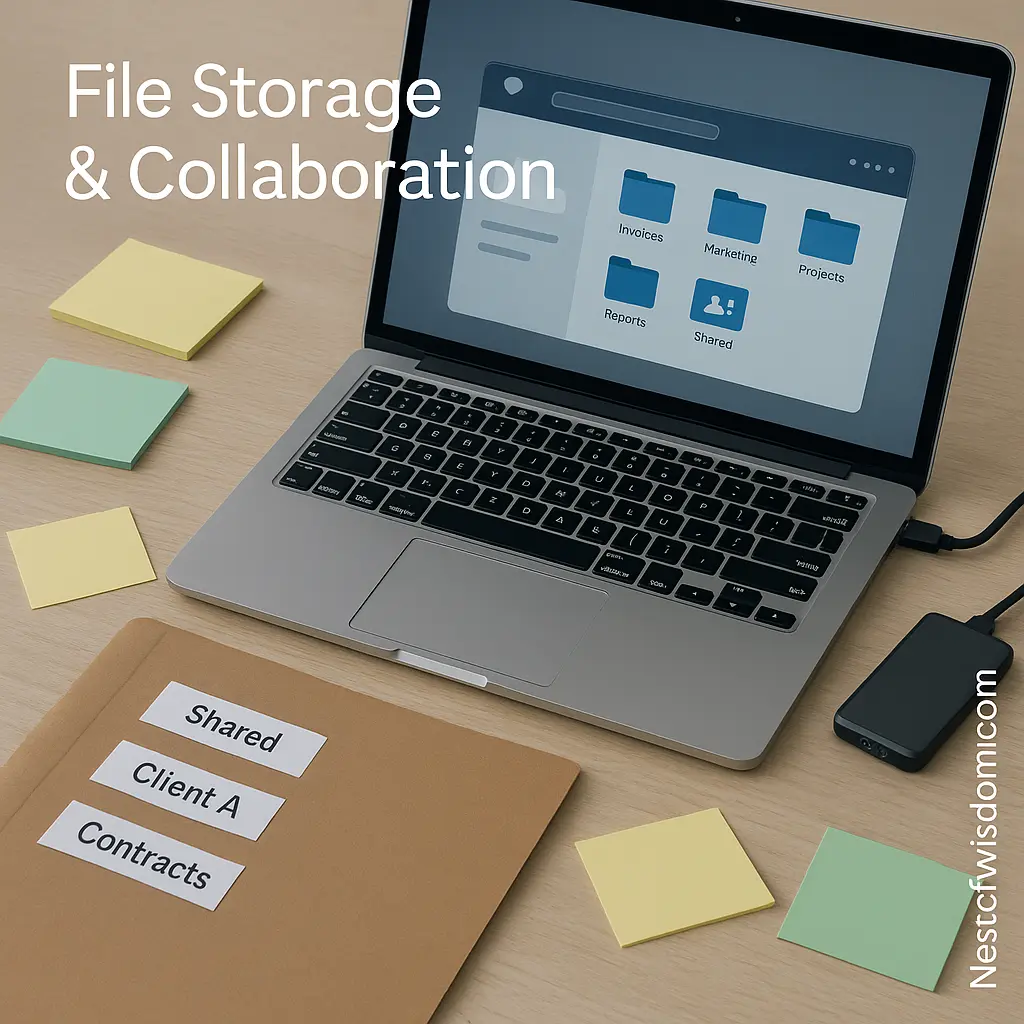Cloud Tools for Small Businesses and Freelancers are the operating system of modern work. Whether you run a five-person agency or deliver projects as a solo professional, the right stack of Cloud Tools for Small Businesses and Freelancers compresses delivery time, improves client communication, and protects sensitive data—without heavy IT overhead. சரியான கிளவுட் கருவிகள் நேரத்தையும் நம்பிக்கையையும் காக்கும்—அதுவே வெற்றியின் வேகம்.
Table of Contents
- Why Small Teams Need Cloud
- Communication Tools
- Project Management
- File Storage & Collaboration
- Finance & Invoicing
- Marketing & Design
- Cybersecurity Basics for Freelancers & SMBs
- Onboarding & Client Experience
- Automation & Integrations
- KPIs, Reporting & Reviews
- Data Portability, Legal & Exit Plans
- Case Studies & Practical Examples
- 30-60-90 Rollout Plan
- Starter Stack & Buyer’s Checklist
- FAQs
- Conclusion
- References
Why Small Teams Need Cloud
Adopting Cloud Tools for Small Businesses and Freelancers lets you act bigger than your headcount. Instead of buying hardware or maintaining complex software, you rent best-in-class services that work from anywhere. Owners get predictable costs and faster onboarding; freelancers get clearer approvals, cleaner feedback loops, and professional-grade delivery.
The strategic advantage is leverage: tools handle coordination and guardrails so humans can focus on judgment and creativity. Pair the stack with execution discipline—see Delivery Manager Best Practices to design a calm, repeatable rhythm. For personal speedups that compound across teams, read Best AI Productivity Tools for Daily Life (2025). “சரியான அமைப்பு = குறைந்த அழுத்தம், அதிக மதிப்பு.”
Communication Tools
Great communication is where Cloud Tools for Small Businesses and Freelancers deliver instant ROI. Use Zoom or Google Meet for video calls and recordings; Slack (or Microsoft Teams) for channel-based messaging that separates client threads from internal chatter. Reduce meetings by posting a weekly status thread and reserving live calls for decisions.


- Rhythm: Monday goals, Friday outcomes; a short “decisions only” call mid-week.
- Channels:
#client-name/projectfor each engagement;#announcementsfor one-way notices. - Playbook: Pin meeting links, SOW, timeline, and acceptance criteria. Use a standard “status” message format (What we did / Risks / Decisions needed).
- Async first: Post a screen-recorded update before asking for a meeting. Transcribe and summarize to keep history searchable.
Related read: Generative AI in Business—use assistants to auto-summarize threads and surface action items. “வார்த்தை தெளிவு = வேலை வேகம்.”
Project Management
To make work visible and predictable, pick platforms that fit Cloud Tools for Small Businesses and Freelancers. Trello’s Kanban boards suit solos and simple flows; Asana adds timelines, dependencies, and reporting for agencies and SMBs; Notion unifies docs, tasks, and wikis so proposals and delivery live together.


Golden Path Template: Intake checklist → Scope & milestones → Approvals → Delivery → Sign-off. Create one template per service type (design, web, consulting). Add SLA tags (e.g., response within 1 business day) and assign single-threaded owners to avoid diffusion.
- Visibility: Use “Now / Next / Blocked” swimlanes for quick standups.
- Quality: Add a Definition of Done to each task (file path, naming, reviewer, handoff notes).
- Risk: Track a Risks & Assumptions list with owners and due dates.
“ஒரே பாதை, பல வெற்றிகள்.” டெம்ப்ளேட் குழப்பத்தை குறைக்கும்—ஒவ்வொரு முறை ஒரே தரம்.
File Storage & Collaboration
Centralized files are a non-negotiable pillar of Cloud Tools for Small Businesses and Freelancers. Google Drive enables real-time co-editing in Docs/Sheets/Slides; Dropbox excels at large asset sync and external sharing; OneDrive integrates tightly with Microsoft 365. Standardize a naming convention so teams and clients always know the canonical version: Client/Project/YYYY-MM-DD_Deliverable_v1.ext.


Access hygiene: use shared drives (not private folders), label “client-view” vs “internal,” and remove external access at project end. For sensitive docs, require sign-in and set link expiry. Use comments for feedback—avoid emailing file copies. “அனுமதி கட்டுப்பாடு பாதுகாப்பின் அடித்தளம்.”
Finance & Invoicing
Cash flow improves quickly when Cloud Tools for Small Businesses and Freelancers automate billing. Wave offers free accounting for solos; FreshBooks simplifies estimates, invoices, retainers, and time tracking; Zoho Books adds bank feeds and tax support for growing SMBs.


- Terms that protect you: deposit up-front, milestone-based releases, late fee policy, scope-change clause.
- Automation: recurring retainers; auto-send receipts; reconcile weekly; separate operating vs tax accounts.
- Signals: track Days Sales Outstanding and on-time payment rate; shorten cycles with instant payment links.
Also see: Best Budgeting Apps for Indian Families—habits here help business finances too. “பணம் ஒழுங்காக வந்தால் மன அமைதி உறுதி.”
Marketing & Design
Consistent branding and simple automation are core wins of Cloud Tools for Small Businesses and Freelancers. Canva handles on-brand graphics and slide decks; Mailchimp manages newsletters, landing pages, and basic automations; Buffer or Meta Business Suite schedules posts and compares performance.
Cadence that compounds: Weekly posts across four buckets—how-to, case study, customer story, and industry insight. Recycle long-form posts into 3–5 micro-assets each. Maintain a Notion content calendar and an asset library in Drive/Dropbox for reuse. “சீரான உள்ளடக்கம் நம்பிக்கை உருவாக்கும்.”
- Use UTM tags on every link; review analytics monthly.
- Create simple brand guardrails (colors, fonts, voice) in a one-page style guide.
- Build a lightweight “lead nurture” with a welcome email + 2 value emails + 1 case study.
Cybersecurity Basics for Freelancers & SMBs
Security must be built into Cloud Tools for Small Businesses and Freelancers from day one. Use a password manager (Bitwarden/1Password), enable MFA everywhere, keep devices patched and encrypted, and maintain cloud backups. Practice least-privilege per client and revoke access at project end. Publish a one-page “Data Handling & Incident Response” note for client trust. “காவல் முதலில், வேலை அடுத்தது.”
- MFA on admin and email accounts; add it to invoicing, storage, and PM tools.
- Device hygiene: full-disk encryption; auto-lock; monthly patch day; separate work profile.
- Backup: follow the 3-2-1 rule and test restores quarterly.
- Audit & logs: review shared link reports and admin logs; remove stale users.
- Client assurances: a short policy covering data separation, retention, and incident steps.
Onboarding & Client Experience
The fastest way to feel “big company professional” with Cloud Tools for Small Businesses and Freelancers is world-class onboarding. Clients want clarity, not complexity.
- Welcome kit: one page with tools used, how to reach you, response times, and a link to the shared folder + PM board.
- Discovery form: gather brand, goals, constraints, and timeline in a simple form that auto-creates a project.
- Kickoff rhythm: 30-minute call to confirm scope, risks, and the “golden path” milestones.
- Feedback rules: ask for consolidated comments in Docs/Slides; discourage scattered email notes.
“தொடக்கம் தெளிவாக இருந்தால் பாதி வேலை முடிந்தது.”
Automation & Integrations
Cloud Tools for Small Businesses and Freelancers shine when connected. Examples: auto-create a Trello/Asana project from a signed proposal; push paid-invoice events to a #billing channel; archive project folders and revoke guest access at sign-off. Start with one or two integrations that remove weekly toil and revisit quarterly.
- High-leverage workflows: form → task list; time entries → invoice draft; scheduled post → asset archive.
- Guardrails: rate-limit automations; log actions to a shared “ops” doc for visibility.
“சிறிய தானியக்கம்—பெரிய பலன்.”
KPIs, Reporting & Reviews
Dashboards in your Cloud Tools for Small Businesses and Freelancers stack keep goals honest. Track:
- Throughput: tasks completed per week, cycle time, and blockers cleared.
- Financial health: Days Sales Outstanding, on-time payment %, and gross margin per project.
- Client sentiment: a two-question pulse at milestone handoffs (score + free text).
- Marketing: email open/click, top-of-funnel leads, and conversion to discovery calls.
Hold a 60-minute monthly review to inspect KPIs, decide one improvement, and position the next experiment.
Data Portability, Legal & Exit Plans
As your Cloud Tools for Small Businesses and Freelancers mature, plan for portability and compliance. Favor vendors that support export (CSV/JSON/PDF), role-based access, audit logs, and clear off-boarding. Keep a “break-glass” account for emergencies and document how to rotate credentials.
- Privacy & consent: clarify what client data you store, for how long, and who can access it. Obtain written approval for testimonials and logos.
- Regional rules: understand basics of GDPR/CCPA where relevant; keep client data segregated by workspace.
- Exit checklist: deliver final files, transfer ownership of shared assets, revoke third-party access, and archive contracts.
Note: This isn’t legal advice—use it as a practical checklist when you speak with your advisor.
Case Studies & Practical Examples
Freelance Designer (Solo)
By standardizing on Cloud Tools for Small Businesses and Freelancers—Slack + Trello + Google Drive—turnaround time dropped ~30% as feedback moved from email chaos to organized threads with linked files.
5-Person Digital Agency
The team adopted Asana timelines, FreshBooks retainers, and Drive shared folders. With these Cloud Tools for Small Businesses and Freelancers, payment delays fell sharply after enabling online payments and automated reminders.
Online Boutique (SMB)
Moving assets to Dropbox, content planning to Notion, and campaigns to Mailchimp showed why Cloud Tools for Small Businesses and Freelancers scale: seasonal promos scheduled a month early, analytics guided creatives, and the owner reclaimed 6–8 hours/week.
30-60-90 Rollout Plan
Adopt Cloud Tools for Small Businesses and Freelancers in phases so the team learns by doing.
- Days 1–30: Decide your “one tool per category,” set up shared drives and PM templates, publish the onboarding kit.
- Days 31–60: Add invoicing automations and a content calendar; run your first KPI review.
- Days 61–90: Connect integrations (proposal → project; invoice → Slack). Document the exit plan and test a restore from backup.
Starter Stack & Buyer’s Checklist
Start lean: one per category, then add only when you hit limits.
- Calls: Zoom/Meet/Teams
- Messaging: Slack/Teams
- PM: Trello/Asana/Notion
- Files: Google Drive/Dropbox/OneDrive
- Finance: Wave/FreshBooks/Zoho Books
- Design & Email: Canva + Mailchimp
- Security: Bitwarden/1Password + MFA + backups
Checklist: Does it support MFA/SSO, role-based access, export, mobile, and audit logs? Is support responsive? What happens if you leave (data portability)?
FAQs
1) Which Cloud Tools for Small Businesses and Freelancers should I start with?
Begin with one per category: Zoom (calls), Slack (messages), Trello (tasks), Google Drive (files), FreshBooks or Wave (invoices), Canva (design), plus a password manager. Add more only when current tools hit limits.
2) Are free plans enough?
Often yes for solo work. As teams grow, paid tiers—guest seats, automations, advanced permissions—pay for themselves in saved hours and fewer mistakes.
3) How do I avoid tool overload?
Define a “golden path”: one communication tool, one PM tool, one storage tool, one finance tool. Document the process in Notion or Drive and share it with clients.
4) How do these tools help revenue?
The stack reduces admin time, prevents missed deadlines, and keeps collaboration smooth. The compounding effect of Cloud Tools for Small Businesses and Freelancers is more billable work and better client retention.
5) What about data privacy using cloud apps?
Pick reputable vendors, enable MFA, isolate each client’s data in separate spaces, and revoke access promptly. A short incident-response note adds professionalism and trust to your Cloud Tools for Small Businesses and Freelancers policy.
Conclusion
Cloud Tools for Small Businesses and Freelancers create leverage that shows up in delivery speed, client satisfaction, cash flow, and data protection. Start lean—one proven tool per category—then templatize repeatable steps and automate after the core workflow feels smooth. With a disciplined stack of Cloud Tools for Small Businesses and Freelancers, you’ll spend less time on admin and more time on high-value work clients happily pay for. “திட்டம் + தானியக்கம் = தொந்தரவு குறைவு, மதிப்பு அதிகம்.”
Related on NestOfWisdom: Delivery Manager Best Practices · Best AI Productivity Tools (2025) · Generative AI in Business · Best Budgeting Apps
References
- CISA — Cyber Guidance for Small Businesses (MFA & admin protections)
- NIST SP 800-63B — Digital Identity Guidelines (Authentication)
- Microsoft — Mandatory MFA enforcement timeline (Azure/Entra/M365)
- U.S. SBA — Strengthen Your Cybersecurity (SMB best practices)
- Harvard Business Review — Cloud helps smaller, newer firms compete
Nest of Wisdom Insights is a dedicated editorial team focused on sharing timeless wisdom, natural healing remedies, spiritual practices, and practical life strategies. Our mission is to empower readers with trustworthy, well-researched guidance rooted in both Tamil culture and modern science.
இயற்கை வாழ்வு மற்றும் ஆன்மிகம் சார்ந்த அறிவு அனைவருக்கும் பயனளிக்க வேண்டும் என்பதே எங்கள் நோக்கம்.
- Nest of Wisdom Authorhttps://nestofwisdom.com/author/varakulangmail-com/
- Nest of Wisdom Authorhttps://nestofwisdom.com/author/varakulangmail-com/
- Nest of Wisdom Authorhttps://nestofwisdom.com/author/varakulangmail-com/
- Nest of Wisdom Authorhttps://nestofwisdom.com/author/varakulangmail-com/
Related posts
Today's pick
Recent Posts
- Internal Linking Strategy for Blogs: A Practical, Human-Centered Playbook
- AI in the Automotive Industry: A Practical, Human-Centered Guide
- Cloud Tools for Small Businesses and Freelancers: The Complete Guide
- Generative AI in Business: Real-World Use Cases, Benefits & Risks
- 7 Life-Changing Daily Habits for Weight Loss Without Dieting

